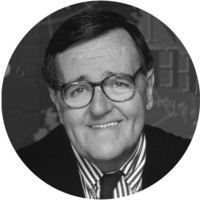Tom Rath, the New Hampshire Republican, is one of the really good guys. A former state attorney general and advisor to the presidential campaigns of Howard Baker, Bob Dole, Lamar Alexander and George W Bush, Rath is the savvy and witty pol who answers your calls and gives good quote. This year, as in 2008, Rath is a national counselor to Mitt Romney, about whose appeal he observed: "Ordinarily, your candidate wins hearts and the head follows. But this time (2012), we may win heads and the hearts will follow."
Mitt Romney, about whom there are precious few endearing anecdotes, locked up Rath's heart in the summer of 2010 shortly after it was reported that Rath, with a blood-alcohol level of 0.11 percent, had been arrested for driving under the influence. Rath called Romney and offered to minimize embarrassment to the candidate by resigning from the campaign. Romney rejected the offer: "No, you and I are joined at the hip." Then Romney, the former Mormon bishop, quipped to Rath, a Catholic, "You know, Tom, if you belonged to my church, you wouldn't have had this problem."
One interesting return from New Hampshire's first-in-the-nation primary is that between them, the two Mormon candidates — Romney and ex-Utah Gov. Jon Huntsman, who finished third — collected 62 percent of the Catholic vote, while the two Catholic candidates — Newt Gingrich and Rick Santorum — together won just 19 percent of the vote of their co-religionists. Romney and Huntsman corralled 56.2 percent of the total vote.
New Hampshire voters struck a blow for religious tolerance, which is good news after the sobering news from the Quinnipiac University national poll, which last year asked whether "you'd be entirely comfortable with, somewhat comfortable with, somewhat uncomfortable with or entirely umcomfortable with" a "Mormon president of the United States?" A full 36 percent (19 percent "somewhat uncomfortable" and 17 percent "entirely uncomfortable") owned up to their personal uneasiness with a Mormon in the oval office. The resistance was highest among both Democrats (42 percent) and liberals (41 percent) — more ideological than theological? — and, surprisingly, among the youngest, voters ages 18 to 34 (42 percent).
Americans are conflicted about politics and religion. To be a presidential candidate, you have to have a religious affiliation, generally Protestant. Until 12 months before his own 1952 election, Dwight Eisenhower had belonged to neither a church nor a political party. He became in turn a Republican and a Presbyterian, which prompted one Democratic wag to quip: "If you're going to be a Republican, why not be an Episcopalian? They're better dressers."
Voters seem generally more comfortable with presidential candidates who are church members rather than true believers. Before he decided to seek the 1968 Republican presidential nomination, the admirable Michigan Gov. George Romney, like his son a committed Mormon, announced he would fast and meditate. This news — just like later reports that President Jimmy Carter, a committed Baptist, paused five or six times during the workday to pray — appeared to make American voters uneasy. The unwritten instructions for national candidates seemed to be: We prefer that you have a reasonably sincere profession of faith, but that you not practice those beliefs too seriously.
In New Hampshire, Republican primary voters in 2012 passed their first major religious tolerance test. Now it's South Carolina's turn.
To find out more about Mark Shields and read his past columns, visit the Creators Syndicate web page at www.creators.com.






View Comments